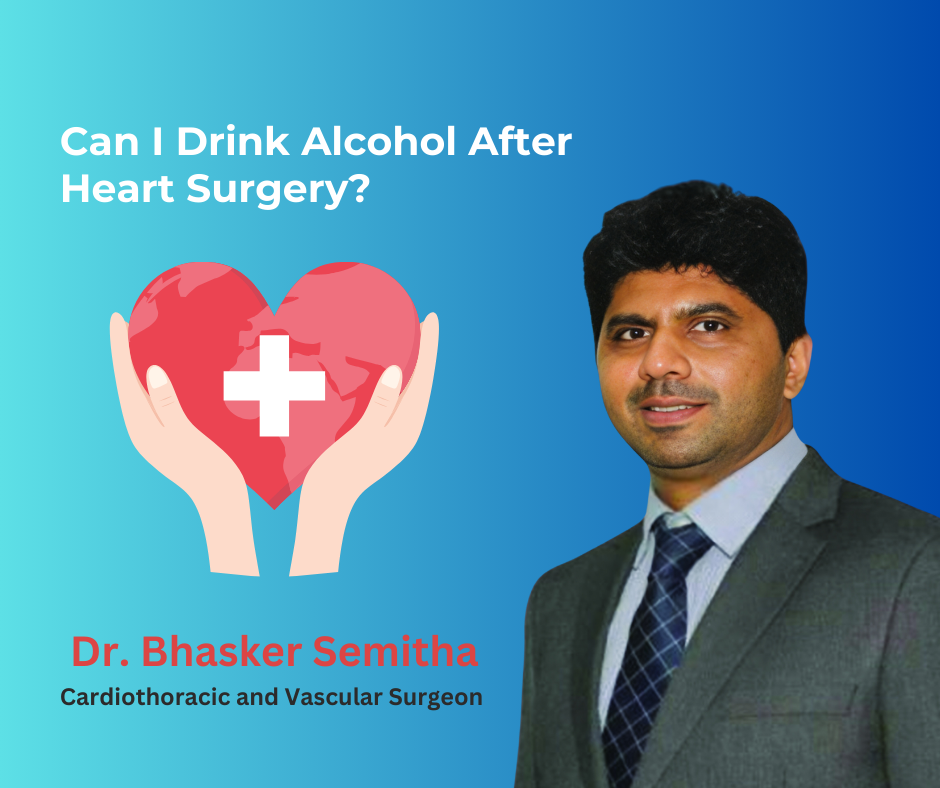Heart surgery is a significant medical procedure, and your recovery requires careful attention to various lifestyle choices. One common question many patients have is whether they can safely consume alcohol after heart surgery. While it’s natural to want to return to your regular routine, it’s important to understand how alcohol can impact your recovery and long-term heart health.

Understanding the Impact of Alcohol on the Heart
Alcohol affects the heart in several ways. Moderate consumption can have some cardiovascular benefits, such as increasing good cholesterol (HDL) levels and providing some protection against heart disease. However, excessive alcohol intake can lead to numerous health problems, including high blood pressure, cardiomyopathy (a condition that weakens the heart muscle), arrhythmias (irregular heartbeats), and even heart failure.
Alcohol After Heart Surgery: What You Need to Know
After heart surgery, your body is in a state of recovery. Your heart, which has undergone significant stress, needs time to heal. Introducing alcohol into your system during this delicate phase can pose several risks:
- Interference with Medications: After heart surgery, you’re likely on medications such as blood thinners, beta-blockers, or statins. Alcohol can interfere with these medications, either enhancing or diminishing their effects, which can be dangerous. For instance, alcohol can increase the risk of bleeding if you’re on blood thinners or lower your blood pressure too much if you’re on beta-blockers.
- Delayed Healing: Alcohol consumption can impair your immune system and slow down the healing process. It can also increase the risk of infections, which is critical to avoid post-surgery.
- Impact on Heart Function: Drinking alcohol, especially in excess, can lead to fluctuations in heart rate and blood pressure. These changes can be harmful, particularly when your heart is still healing from surgery.
- Increased Risk of Complications: Post-surgery, you are at a higher risk of complications like arrhythmias or blood clots. Alcohol can exacerbate these risks, leading to potentially life-threatening situations.
When Is It Safe to Resume Drinking?
If you’re considering drinking alcohol after heart surgery, it’s crucial to have a conversation with your cardiologist or surgeon. Generally, it’s advisable to avoid alcohol for at least a few weeks or even months after surgery, depending on your specific condition and the type of surgery you had.
Once you have fully recovered and your doctor gives you the green light, you may be able to enjoy alcohol in moderation. Moderation typically means up to one drink per day for women and up to two drinks per day for men. It’s also important to choose heart-healthy options, such as red wine, which contains antioxidants like resveratrol that may benefit your heart.
Tips for Safely Reintroducing Alcohol
If your doctor approves moderate alcohol consumption, here are some tips to help you enjoy it safely:
- Start Slowly: Begin with small amounts and see how your body reacts. Pay attention to any unusual symptoms like dizziness, heart palpitations, or shortness of breath.
- Stay Hydrated: Alcohol can dehydrate you, so be sure to drink plenty of water alongside any alcoholic beverages.
- Avoid Mixing with Medications: If you’re still on medications, consult your doctor about the best times to consume alcohol to avoid interactions.
- Monitor Your Heart: Keep an eye on your blood pressure and heart rate when you drink, and report any irregularities to your healthcare provider.
Conclusion
While it may be tempting to return to your usual habits after heart surgery, it’s important to prioritize your heart health during recovery. Alcohol can have significant effects on your body, particularly when you’re healing from a major procedure. Always consult with your healthcare team before reintroducing alcohol into your diet, and remember that moderation is key to maintaining a healthy heart in the long term.

